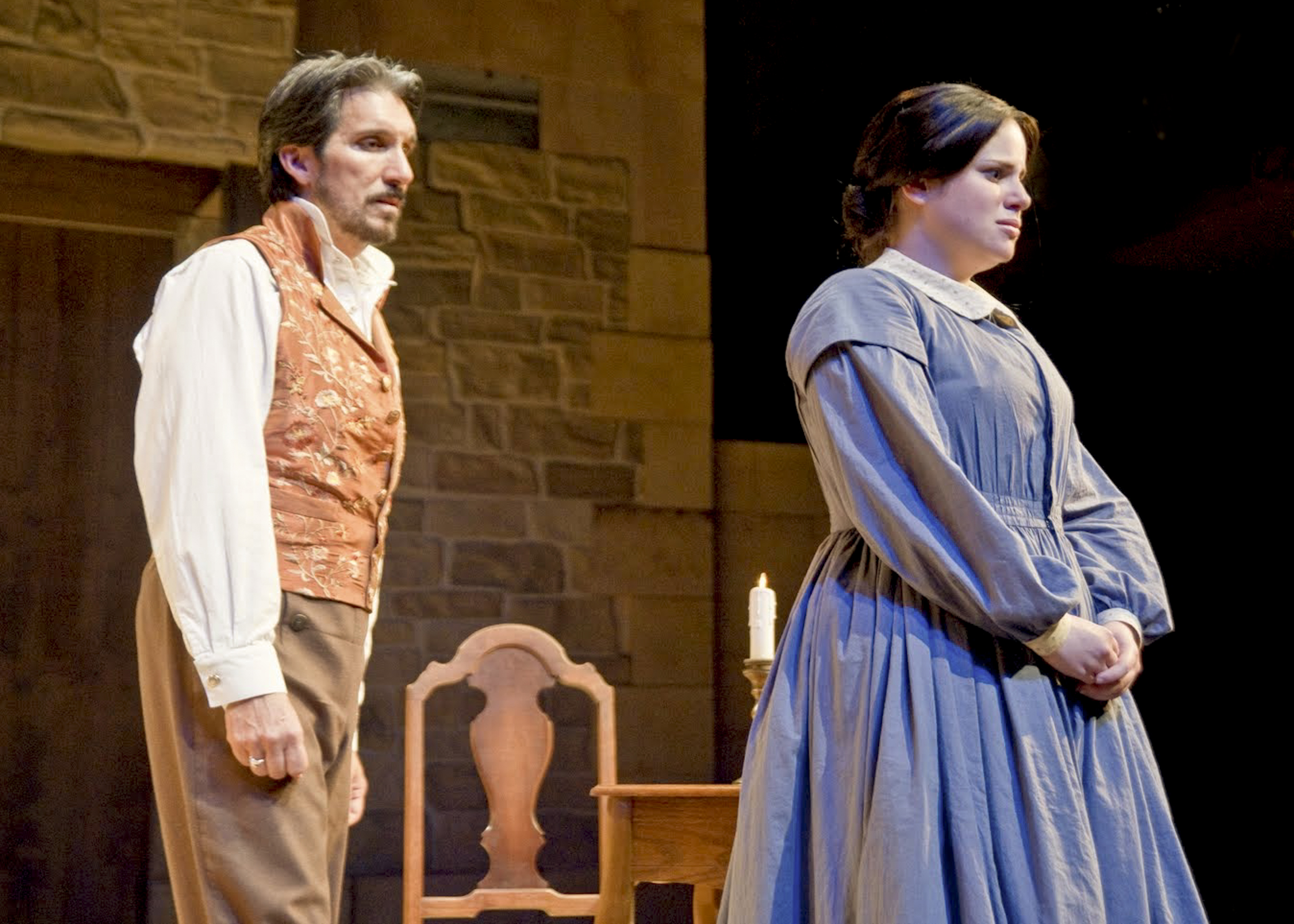Opening Nights
PJane Eyre
Taproot Theatre, 204 N. 85th St., 781-9707, taproottheatre.org. $20–$40. Runs WEd.–Sat. Ends Aug. 16.
Musical theater has had some success with neglected orphans (Annie or Oliver!, anyone?), so an adaptation of Jane Eyre was probably inevitable. Charlotte Bronte’s 1847 novel is, after all, one of the earliest female coming-of-age tales ever told, set decades prior during the Georgian period. The show premiered on Broadway 14 years ago, and it might sound like a slog. Quite the opposite. Directed by Karen Lund, this production moves quickly and seamlessly through Jane’s early tale of woe. The abridgement is a necessary evil in turning 400 pages into two and one-half hours (with a 15-minute intermission); something must be lost.
So instead of tedious ragamuffin reprises, Jane Eyre focuses on our heroine’s middle period. The audience is early on introduced to the soap opera at Thornfield Hall, the massive Yorkshire estate where Jane is hired to work as a governess at the pleasure of apparent bachelor Edward Fairfax Rochester. While Jane’s moral and spiritual progress is still present, it’s her relationship with Rochester that constitutes the heart of the show (created by Paul Gordon and John Caird).
This shortcut is of particular benefit to this compact production, because Art Anderson’s Rochester is a manifold pleasure to behold. He sings well, commands the stage, and mugs for the audience with assurance. Rochester’s vanity and pride are comic, but his tenderness is also clear (especially in duets with Jane). Even as he shares his backstory—including his darkest secrets—it’s easy to imagine Jane falling in love with him. The audience is likely to feel the same.
Unfortunately the same cannot be said for Jessica Spencer, who turns in an uneven performance as the grown Jane. (Abi Brittle plays defiant 10-year-old Jane.) Too often her Jane seems bewildered and lost in her moral and spiritual upheaval; it’s difficult to see the spark that draws Rochester near. In the company of others, Jane becomes a supporting player in a comedy of manners, her lowly governess providing grist for Rochester’s courtly company (to riotous effect by an excellent and elastic ensemble cast, it should be noted).
But when alone, Spencer’s Jane seizes the stage and, if briefly, brings the focus back to our heroine. During the song “Painting Her Portrait” in particular, Spencer gives a jaw-dropping performance, the seeds sown during Jane’s abusive childhood coming to fruition. It is a moving and frightening episode of self-doubt, an integral part of Jane’s transformation in this impressive telling of Bronte’s timeless tale. Mark baumgarten
The Two Gentlemen of Verona
Free. See seattleshakespeare.org for park locations and schedule. Ends Aug. 10.
In 1954, Joseph Papp produced the first “Shakespeare in the Park” festival in Lower Manhattan. Today, those who wish to attend the New York City Shakespeare Festival might arrive as early as 6 a.m. to ensure seats for an evening performance in Central Park. Cities across the globe have adopted this model, bringing free classic theater to the masses. Now in its 10th season, Wooden O—Seattle Shakespeare Company’s outdoor performance arm—is doing the same in parks around Puget Sound.
In The Two Gentlemen of Verona, director David Quicksall creates a milieu defined by greaser youths in denim and leather, jukeboxes, Coca-Cola, bowling, and anything that fits the tastes of mid-century America. You know you’re in Verona when you see the giant billboard that declares your location. You know you’ve met the two gents when you see their Brando-esque slicked-back hair, white T-shirts under leather jackets, and motorcycle-revving. Verona is their Coney Island. Doo-wop and rock are their soundtrack. (No, really, there is a live soundtrack sung by the cast: It interjects and, at times, informs the plot.)
Proteus (Jason Marr) and Valentine (Conner Neddersen) are best buds who spend their days joyriding through Verona. Proteus is in love with hula hoop-skirted Julia (Angelica Duncan)—and here the cast sings the Monotones’ “Book of Love.” Fate splits the two friends as Valentine goes to serve in the court of the Duke of Milan (Jim Gall) and falls for his daughter Silvia (Carolyn Marie Monroe); this prompts “Duke of Earl.” Proteus’ father then splits Proteus from Julia and dispatches him to join Valentine in Milan. Love is flippant—and Proteus quickly makes unwanted advances on Silvia.
What ensues is a comedy of plotting, conniving, scheming, and cross-dressing (cue sing-along to “Walk Like a Man”), plus a clownish servant and his stoic dog. It’s a quirky, retro take on what some consider to be Shakespeare’s first play—and perhaps his weakest. Thematically, Two Gents touches on notions that are seen in many of the Bard’s later, greater works—mistaken identities, love, friendship, betrayal, femininity, and the equivocal nature of words versus action.
Call it an experiment or rough draft; regardless, it’s still enjoyable. Like every other Shakespearean comedy, it cutely—even if not tidily—ties up the loose ends. All qualms, quarrels, and plot complications are brushed under the proverbial rug. The blandness of this play reflects the writing, not the production. Wooden O stages popular performances that rival anything confined by a proscenium arch. (An all-female Julius Caesar is running concurrently on a different schedule.) Two Gents needs some spice, and it gets it here. Irfan ShariFf
E
stage@seattleweekly.com




